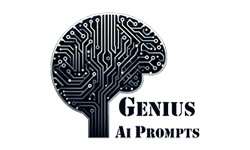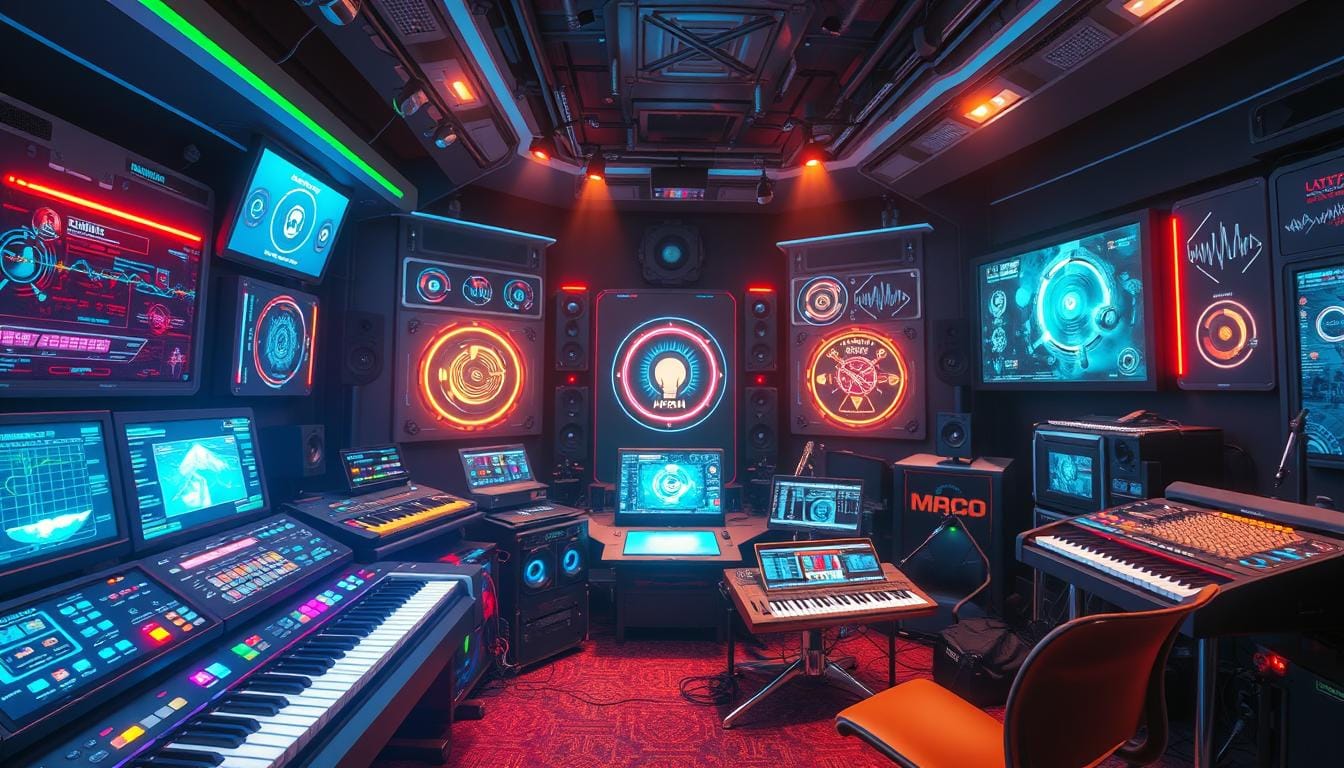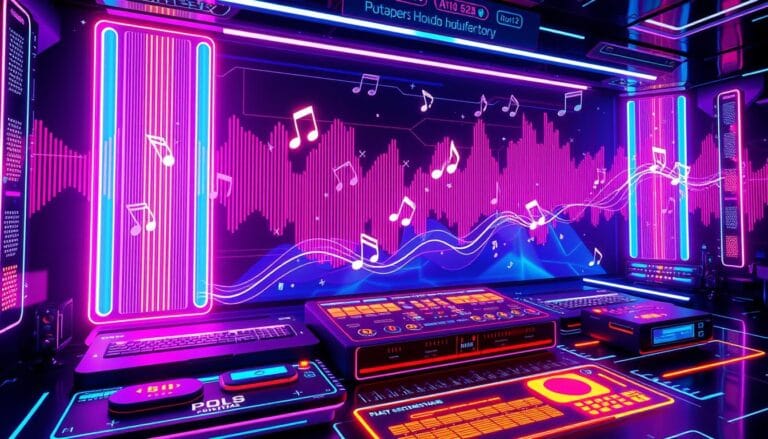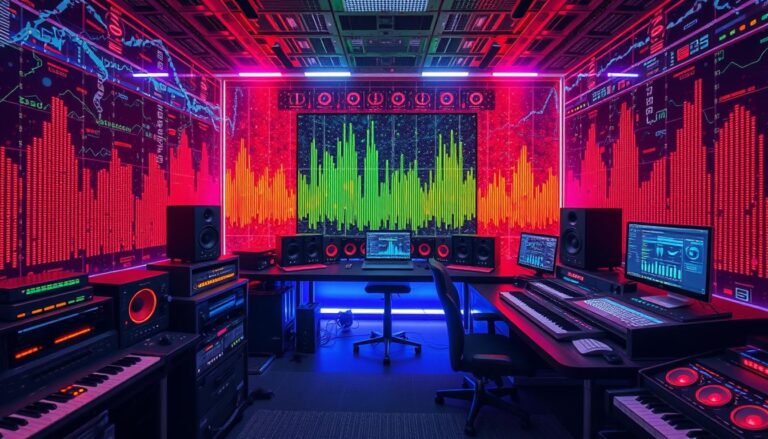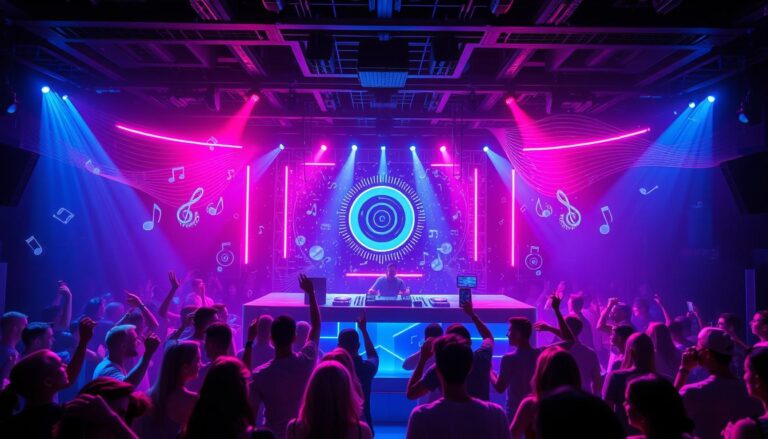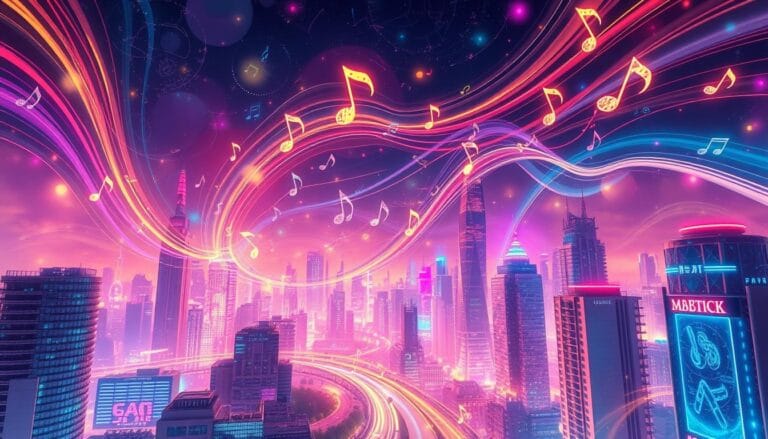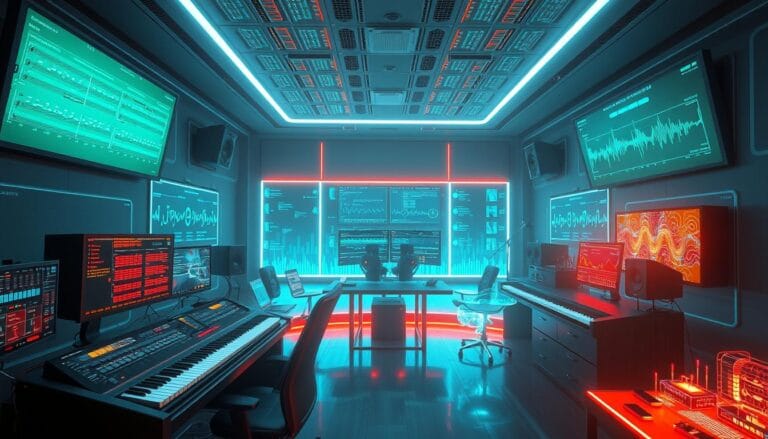Audio AI Music Generator: Create Music Instantly with AI Tools
I’ve always loved how music can move us and take us to new places. But making music used to seem too hard, especially for those without music training. That changed when I found audio AI music generator. These tools are changing how we make music, opening up new creative doors.
Thank you for reading this post, don't forget to subscribe!The AI in music market is growing fast, expected to hit USD 38.7 billion by 2033. This is a huge jump from USD 3.9 billion in 2023. It shows how AI is changing music creation, making it faster and more creative.
Table of Contents
Key Takeaways
- The global AI in music market is projected to reach USD 38.7 billion by 2033, growing at a CAGR of 25.8% from 2024 to 2033.
- AI music generators leverage algorithms to analyze music patterns and generate new compositions.
- These tools offer advantages such as reduced dependence on session musicians, faster background music production, and support for non-musicians.
- Factors to consider when choosing an AI music generator include user-friendly interface, customizable music, and ongoing updates.
- Leading AI music generators in 2024 include Hydra II, AIVA, and Mubert, each with unique features and capabilities.
Understanding AI Music Generation Technology
The world of music is changing fast, thanks to AI. Now, music lovers and creators can use AI tools to make new songs easily. These tools use smart algorithms to learn and copy music patterns.
How AI Algorithms Analyze Music Patterns
AI music tools use special algorithms to get music. They look at melody, harmony, rhythm, and lyrics. This lets them make new songs that sound like they belong to a certain style.
Core Components of AI Music Generation
The main parts of AI music making are:
- Natural Language Processing (NLP) for understanding and generating lyrics
- Generative Adversarial Networks (GANs) for refining the quality of AI-generated music
- Extensive music datasets, such as MIDI files and audio recordings, to train the AI models
Machine Learning in Music Creation
Machine learning is key in making music with AI. It looks at lots of songs to learn patterns and styles. This lets both pros and hobbyists make music that people enjoy.
“AI-powered music generation tools are revolutionizing the way we create and experience music, opening up new avenues for artistic expression and content creation.”
The Growing Impact of Audio AI Music Generator Tools
In recent years, ai-powered music creation and ai music maker tools have changed the music industry a lot. These new technologies make music production easier for many people. Now, content creators, ad agencies, and solo artists can make professional-sounding music with just a few clicks.
AI music generators can make high-quality, royalty-free music for many uses. This includes ads, videos, podcasts, and social media. This change has made music creation more accessible. Even those without music training can now make music that sounds as good as professional tracks.
AI algorithms have improved a lot. They can now analyze music patterns, create different sounds, and even make vocals sound like a real person. But, this has also raised questions about copyrights and how these AI systems are trained. This has led to legal issues and ongoing talks in the music world.
| AI Music Generation Advancements | Implications and Concerns |
|---|---|
|
|
As ai-powered music creation and ai music maker tools get better, the music world is facing both new chances and old worries. These tools could make music better and more personal. But, they also make us wonder about the future of creativity and the role of human artists.
Benefits of Using AI Music Generators for Content Creation
AI music composer tools have changed the music world. They offer many benefits for creators and businesses. These tools use artificial intelligence to make music creation easier and faster.
Cost-Effective Music Production
AI music generators help both new and experienced composers. They provide affordable ways to make music. This is great for independent musicians and those working on passion projects.
Time-Saving Advantages
AI music generators help save time for seasoned composers. They automate tasks that take hours. This lets creators focus on the creative parts of their work.
Customization Capabilities
AI music generators can create music in any style. Tools like Soundful let users create melodies and try out different sounds. This customization helps creators express their unique ideas.
The benefits of ai music composer tools are clear. They save time, money, and offer customization. As automated music composition grows, these tools will change how we make music.
“AI music generators do not aim to replace human composers but rather augment the creative process, providing a new perspective and tools for music creation.”
Essential Features of Professional AI Music Tools
Exploring ai music production and intelligent music generation requires knowing key features. Professional AI music tools offer more than basic functions. They have a wide range of features to make your creative process smoother and improve audio quality.
A user-friendly interface is crucial. The top AI music generators make it easy to start with drag-and-drop features and tutorials. You can also customize music settings like genre, tempo, and instrumentation. This lets you match the music to your project’s needs.
- Seamless user experience with intuitive controls and guidance
- Customizable music settings for precise genre, tempo, and instrumentation
- Professional audio standards and regular feature updates
- Flexible pricing models to suit diverse budgets and needs
Top ai music production tools use the latest in machine learning and AI. This ensures the music is engaging and high-quality. They also get updates regularly, keeping you up-to-date with industry trends.
Finally, consider the pricing of the AI music generator. Look for options that fit your budget, from free plans to full subscriptions. This way, you can choose what works best for you.
By focusing on these key features, you can fully use AI for music creation. This will enhance your content with professional, customizable, and seamless audio.
Top AI Music Generation Platforms in 2024
The world of AI music generation is growing fast. New platforms are coming out to meet different creative needs. These tools change how artists, creators, and businesses make music.
Hydra II by Rightsify: Streamlining Music Creation
Hydra II by Rightsify is a top choice for making music on demand. It lets you create music that’s ready for commercial use. You can make high-quality, legal tracks for your projects easily.
AIVA: Composing Emotional Music with Precision
AIVA is a leading platform for AI music. It makes classical and orchestral music with emotion. It’s great for scoring films, podcasts, or finding unique music.
Mubert: Innovative Real-Time Music Generation
Mubert is a cutting-edge AI music generator. It creates music in real-time, adapting to your mood. It also has a developer API for easy integration. Mubert works with artists, offering a new way to make music.
Other notable platforms include Soundful and SOUNDRAW. They offer unique features for different needs. As demand grows, these tools will be key for creators and businesses.
| Platform | Key Features | Pricing |
|---|---|---|
| Hydra II by Rightsify | On-demand music creation for commercial use, instant global distribution, and full legal compliance | Subscription-based plans with custom pricing |
| AIVA | Emotional music composition, focus on classical and orchestral music, fine-grained control over musical elements | Standard plan: $16/month, Pro plan: $52/month |
| Mubert | Real-time music generation, developer API, collaboration with human artists, user-generated music options | Free plan, Creator plan: $14/month, Pro plan: $39/month, Business plan: $199/month |
| Soundful | Unlimited music generation, 1 free MP3 download per month, Premium plan: 100 track downloads | Free Standard plan, Premium plan: $5/month |
| SOUNDRAW | Customizable music generation, licensing options for commercial and personal use | Background music plan: $13/month, Industry-focused plans: $26 to $65/month |
These platforms offer a wide range of features and prices. They meet the needs of artists, creators, and businesses. With ai music maker and automated music composition, users can be more creative and efficient.
Legal Considerations and Licensing in AI Music Creation
The ai music production world is growing fast. It’s key for creators to know the legal side of intelligent music generation. The rules on who owns AI music and how it’s licensed are still unclear.
Platforms like Soundful give users non-exclusive licenses for their AI music. This lets creators make money without worrying about copyright issues. But, they can’t put AI music on big platforms like Spotify. These platforms have strict rules about AI music.
| Platform | Licensing Approach | Commercial Use Allowance |
|---|---|---|
| Soundful | Non-exclusive perpetual license | Monetization allowed, but no direct distribution on major streaming platforms |
| AIVA | Royalty-free licensing for personal and commercial use | Flexible commercial use, but restrictions on direct distribution |
| Mubert | Subscription-based licensing with commercial use rights | Monetization permitted, but platform-specific guidelines apply |
Creators need to check the licensing rules of each ai music production platform. They should know what they can and can’t do with the music. Things like making money, creating new works, and following platform rules can differ a lot.
“The legal landscape of AI-generated music is complex and evolving, prompting companies like Soundful to prioritize user creativity and legal compliance.”
The law on AI music is still up in the air. There are debates about who owns the music. But, platforms like Soundful try to follow the rules. They want to help creators while dealing with the legal challenges of this new field.
Best Practices for Creating Music with AI Tools
Music composition AI and AI-powered music tools have changed how we make music. To get the most out of these new tools, it’s key to follow best practices. This includes optimizing your workflow, keeping genre-specific considerations in mind, and ensuring quality.
Workflow Optimization Tips
Start by setting clear goals for your AI-assisted music project. Get to know the features of the AI tool you’re using. This helps you use the tool’s strengths and makes the process smoother.
Try different settings like mood, genre, and tempo to find the right sound. This way, you can create music that fits your vision.
Genre-Specific Considerations
When using AI tools for music, think about the genre you’re working in. Look at rhythm, melody, and harmony. Use the tool’s options to make the music fit the genre’s style.
This focus on detail ensures your AI music meets your audience’s expectations. It makes your music sound authentic and right for your genre.
Quality Control Methods
To keep your AI music at top quality, use strict quality control. Listen to the tracks carefully and compare them to professional music. Look for areas to improve, like mixing or emotional depth.
Make adjustments as needed. Keep working to reach the quality and authenticity you want. This way, you can make music that stands out and connects with your audience.
By following these tips, you can use AI tools to improve your music-making. You’ll make your workflow better, create more, and produce music that your audience loves.
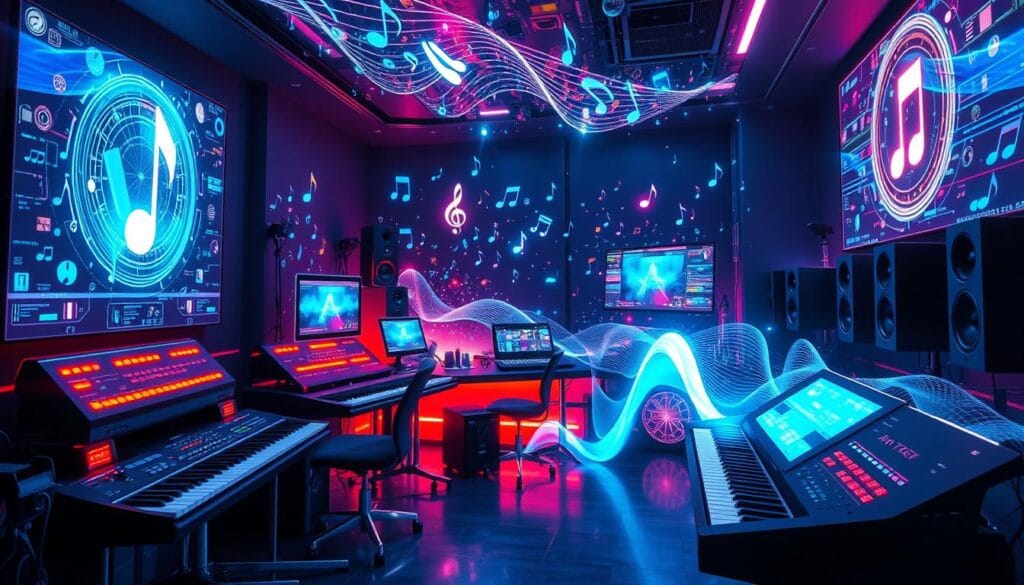
“AI music tools revolutionize music production by turning old, forgotten concepts into new masterpieces with efficiency and creativity.”
Limitations and Challenges of AI Music Generation
Artificial intelligence music generation and machine learning music creation have made big strides. Yet, they still have limits and challenges. One big worry is losing the human touch and emotional depth in AI music. AI tools can make music sound mechanical, lacking the personal flair humans add.
There’s also a risk of music sounding too similar. As more people use the same AI tools, music might become repetitive. Keeping music diverse and unique is key, especially with AI’s growing role in music.
- Copyright and ownership issues are still unclear. Who owns AI-generated music is a big debate needing more rules.
- Adding human creativity to AI music is vital. It’s important to balance AI’s strengths with human touch for music’s emotional depth.
As artificial intelligence music generation and machine learning music creation keep improving, creators must stay aware of these challenges. They should work to keep the music industry diverse and growing.
“The key is to use AI as a tool, not as a replacement for human creativity. It’s about finding the right balance and harnessing the strengths of both.”
Conclusion
The rise of audio AI music generators has changed the music industry. It gives creators of all levels powerful tools to improve their work. This technology is getting better, and it’s important to find a balance between AI’s efficiency and the human touch in music.
Knowing what AI music tools can do helps users make great music for many uses. These tools save time and money and let users customize their music. The effect of AI music generators is clear.
As the industry grows, we must think about the legal side and use these tools responsibly. We need to protect the rights of artists and composers. By using AI tools wisely and keeping music human, we can open up new possibilities and shape the future of music.
